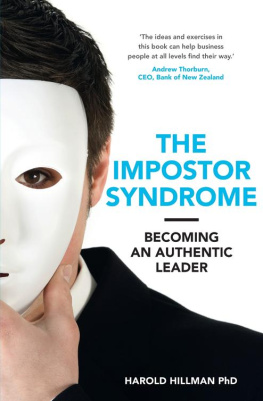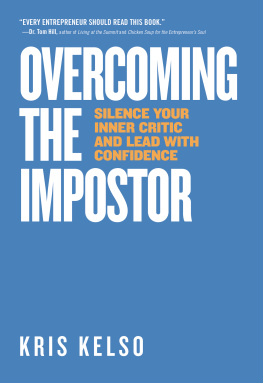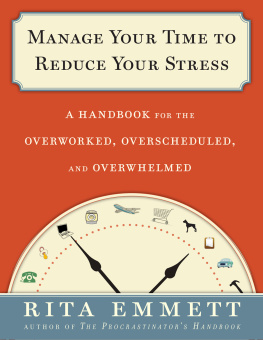


I thank God for my handicaps, for through them, I have found myself, my work andmy God.
HELEN KELLER
J ESSE WAS DYING, and we both knew it. While her health certainly wasnt good fromall the years of abusing her body through starvation, purging, and chronic dieting,it wasnt her physical death that I feared. It was the death of her heart. For manyyears her heart sat frozen beneath layers and layers of countless hurts and unresolvedpain. Without rekindling desire from the distant corners of her soul, I knew shedidnt have a prayer.
As her therapist, I had been a key player in the metadrama of her life for almosta decade. The consummate encourager, I tried to pour God-sized truths into her woundedheart, hoping that somehow I could convince her of her value and worth. Maybe thatwas the problem, though. I wasnt the one she needed to hear fromGod was, and Hisvoice seemed to be consistently sabotaged by the Impostor that eventually overtookher identity.
There were times when I thought she had given up on life completely, only to seeher resurrect her heart once again from the ash heap of loss. Her tenacity amazedme. Slowly she became willing to risk stepping out from behind the shadow of theImpostor she had created in order to find her own identity. This was no easy task.There were days when his voice would overpower her willingness to choose wisely,and her anger would erupt with fury. She blamed herself, she blamed others, and sheblamed God.
I remember asking her one day when she decided to stop believing God had a plan forher life. It took a long time for her to find the answer. But together, as we putall the pieces of the puzzle in place, she found more than answers. She found theheart of God.
As for me, I never lost hope she could recover and live the abundant life Christhad designed her to live. I carried that faith for both of us for quite a while.
In truth, Jesse wasnt much different from the many women I have counseled over theyears who have struggled with disordered eating and identity issues. She was bright,talented, a perfectionist, and exceptionally beautifuland everyone noticed. Sheonce told me that by age ten she had already become addicted to the praise and admirationof others. When she entered adolescence, everything she did became centered on beingperfect and looking perfect.
It eventually drove her to destruction. By age thirty she had been in and out ofmore treatment facilities than she cared to remember. Nothing worked. Something wasdriving hersome secret she seemed afraid to reveal, a secret she said she wouldnever tell anyone.
Until one day she decided to tell me.
COMING OUT OF HIDING
The National Eating Disorders Association estimates there are twenty million Americanwomen who suffer from some kind of eating disorder.
But people with eating disorders arent the only ones hiding today. The entire humanrace hides. Why? Because we all fear rejection, and if we put on a mask and pretendwere perfect, well, maybe no one will notice were not.
Perhaps we fear exposure. Perhaps were terrified someone will find out who we reallyare and leave us. At the heart of the matter, we fear being knownso we hide, and we develop all sortsof coping strategies and call them disorders in an attempt to quiet the silent screamof our own souls.
When does it happen? When does the bottom drop out for someone and lead them intosuch maladaptive behavior patterns as addictions and eating disorders? Is there away to predict the fallout and maybe do something on the front end of things toavoid it? How in the world does someone develop an eating disorderor any other typeof disorder for that matter?
The answer to those questions is as complex as the men and women who struggle. Butthrough my years of treating different types of mental health issuesuch as eatingdisorders, low self-esteem, anxiety, depression, and loss issuesI have come to identifysome common themes that set the stage for what I call the Impostor, who eventuallyovertakes a persons identity.
To help you, the reader, understand and deal with these issues as they show up inyour own life, well explore some of the messages, lies, thinking errors, and othercontributing factors that set up this Impostor, or false self, that seeks to replaceyour true self.
Most importantly youll learn what it takes to distinguish the Impostors identityfrom the one that is intrinsically yours to claim in Christ. Healing will come asyou gain the courage to remove the Impostors mask and begin the journey of self-discovery.
What that means, though, is that you will have to risk coming out of hiding.
TO TELL THE TRUTH
Back in 1956, there was a popular game show on television called To Tell the Truth.It ran for about forty-five years in various formats, and I think the idea behindthe show fits nicely to set up this whole concept of an Impostor. The show featureda panel of celebrity judges who attempted to identify a described contestant whohad an interesting or unusual story. Two other contestants were impostors, pretendingto be the original character.
The panel of judges would question the three contestants, and the impostors wereallowed to lie to convince the judges they were the real character. However, thecentral character was sworn to tell the truth about his or her identity. After thequestioning was done, the panel voted on who they believed was the real character.At the end of the show the host would say, Will the real (persons name) pleasestand up? The central character was then revealed. Prize money was awarded to thechallengers based on the number of incorrect votes the impostors could draw.
As I watched clips of some of these old shows, I couldnt help but think about thison a spiritual level. It occurred to me that the only thing that separated the centralcharacter from the impostors was a birthright. The central character had a birthcertificate that confirmed his or her true identity, a document that authenticatedwho he or she was.
Thats what we have as believers. We have a birth certificate that gives us a newidentity, one that can never perish, spoil, or fade.
God made provision to take us out of Adam and place us into Christ. He exchangedthe old man for the new. This identity that we have been given provides us with everythingwe need for life. Did you catch that? Everything. Not one thing, not some things,not a bunch of thingsbut everything! We dont have to pretend, and we dont haveto perform. Its totally free, and all we have to do is receive it.
You see, in the game show the central character didnt have to do anything to bewho he or she claimed to be. All that was necessary was for that person to show upand tell the truth. The impostors, on the other hand, had to pretend. They had tolie. They had to try and imitate the central character, but they were counterfeits.They could have walked like, talked like, dressed like, and copied the central characterin every way, shape, or form, but would they ever be the central character? No, becauseidentity is always determined by birth, not by performance.
Why is that important for eating-disordered clientsor any of us, for that matter?Because many of us are walking in a false identity, an identity weve created wherewe have to wear masks and pretend like we have it all together. You see, if we dontknow who we are, if we believe we are intrinsically flawed or something is wrongwith us, then we will need to create an Impostor or a false self in order to getour needs met. Thats what the masquerade is all about, isnt it?
Next page











